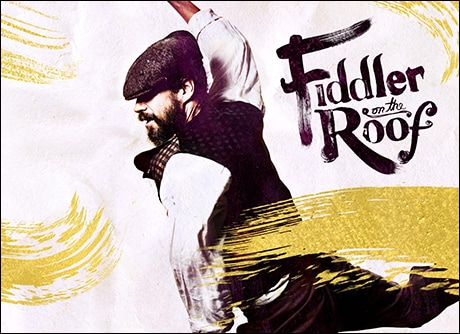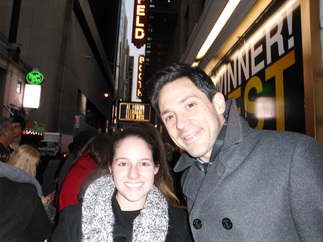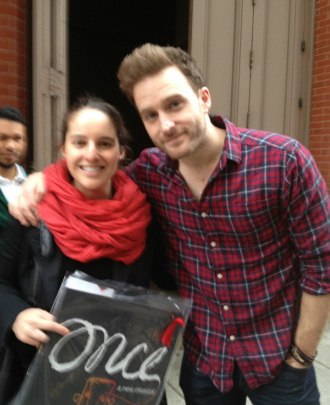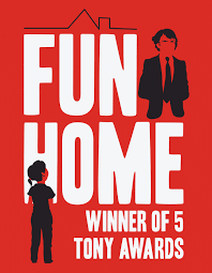 London's Best Vegan Mexican Food: Club Mexicana in Residency at Pamelaby Randi / February 13, 2017
London's Best Vegan Mexican Food: Club Mexicana in Residency at Pamelaby Randi / February 13, 2017If you’ve only seen the movie with Topol, then you still know how great the show and the score are and Topol is on your list of Top Five Mosts. Or maybe you have seen footage of original Tevye, Zero Mostel, or at least have the original Broadway cast recording and love Zero. Topol and Zero set the bar for most Tevyes to be somewhat comical and often over-the-top, as well as establishing the unwritten rule that actors playing Tevye have ridiculous names. But Danny Burstein turned all of that on its head, surprisingly, but beautifully. First of all, his name is Danny. Second of all, his Tevye was more grounded, warmer, and unbelievably charming. His humor – and there was so much of it – came not from the usual comic broadness but more from a place of warmth, sincerity, and Elmo-levels of adorableness. In fact, I would not have been surprised if his Tevye had been given an extra song called “The Letter of the Day” (p.s. my favorite song). He does get angry and mean at times, of course, but it’s more believable and moving because he built up that earnest and loving foundation. He’s a much more rounded and authentic character because of it.
And he wasn’t the only stunningly authentic aspect of this revival. More than any other production of Fiddler, this revival felt real, like it was happening in real life. I mean maybe that’s because it is, actually, happening in some form, and in America no less. But the family and the townspeople came across as people I felt like I knew, whose struggles I cared about sincerely. The sparse set of the farm and the effective lighting helped Danny tell his story in a way that made me forget I was in a theatre. (Well, until the grown ass adults who don’t know how to behave in the theatre needed to be shushed behind me.)
As soon as it began, this production distinguished itself from all others. Bartlett Sher, one of the greatest directors today of golden age musicals, used a very controversial framing device to open and close the show. At the start, Burstein walked onto the stage in modern clothes, wearing a red ski jacket, bare-headed, and he looked around Anatevka while holding a book – the book that Fiddler was originally based on, Tevye And His Daughters, by Sholem-Aleichem (pen name obvs). He said the famous opening line of the show – regarding the precarious perch of a fiddler on the roof, “sounds crazy, no?” – in this outfit. Then he slowly took off the jacket and put on his Tevye cap and prayer shawl and transformed into Tevye, like he was a modern man exploring his ancestors’ history, going to Anatevka both in person and in the abstract. I’d heard a lot of debate about people loving or hating this tiny update, and I expected to hate such a change to a revered classic, but I thought it was very effective in its message. More on that at the end.
That was the only noticeable difference, and in less than a minute we were off to a rollicking start with “Tradition”. The medium-sized chorus on that cavernous empty stage seemed a little wrong at first but the joy of the song and the enthusiasm of the cast improved it. We then saw a little interaction between Tevye, his wife Golde – one of those great early stereotypes of a shrew who always gives her husband a hard time – and the matchmaker Yente. In her small role, Yente is usually worth her comic weight in gold, and although at first I was resistant to Alix Korey’s more restrained Yente (compared to the usual), she quickly won me over with her hilarious, sarcastic line readings.
As we went into “Matchmaker” I remembered that nearly every song of this score is beloved and memorable. I got even more excited but then kind of disappointed, as “Matchmaker” was the one part I was annoyed with. “Matchmaker” should be a bouncy, energetic song. Yet most of this rendition was slow, thudding along sadly despite the song screaming for liveliness. Also, this is one of Tzeitel’s only real moments to shine, yet I thought the usually-great Alexandra Silber was lackluster. Between her substandard vocals and the too-slow tempo, it was the one low point of the production.
Luckily, the next Top 10 hit on the schedule was “If I Were A Rich Man”. If I were a rich man, I would have made a tie in last year’s Tony Awards so that Danny Burstein could have won a much deserved award despite the existence of Hamilton. He was everything. I am still in awe of his performance. He made this ridiculous song feel important and touching and he was so lovable. His little celebratory shimmy that he did throughout “Rich Man” will stand throughout eternity as one of the Top 3 Shimmies, up there with Hillary Clinton’s Debate Shimmy and John Mulaney’s Realtor Trying to Pressure Him into Having a Baby Shimmy.
Tevye’s relationship with his wife was, as was the trend, also more understandable and moving than I’ve ever seen. This is probably because Danny was amazing and Judy Kuhn, as Golde, was his equal. I was kind of upset not to have caught the original Golde of this production, Jessica Hecht, with her kicky beret. (Hecht was Susan, Ross’s ex-wife’s lesbian lover, throughout the entire run of ‘Friends’. You know her.) But not really, because Judy Kuhn was the most exciting replacement they could have possibly announced. She is always dependable and guaranteed to move you to tears even when she only has one song (one insane killer song) like in “Fun Home”. I loved their bickering and Danny was at his funniest when responding to her. And Judy made Golde, who is usually played harsh in her shrewishness, seem like the grounded reasonable one in the family, more pleasant than ever.
As for the daughterssss the daughters, they were solid in general. As I said before, Silber’s Tzeitel was kind of disappointing considering that she is usually great, but she wasn’t bad. I loved Adam Kantor’s Motel (the tailor Motel Kamzoil, as you always have to say), mainly because he was a dead ringer for every boy who went to my camp. Real Main Line Jewish looking. I would have loved to see him as Jamie in “The Last Five Years”. His “Miracle of Miracles” was joyous and fun, although the blocking felt a little off. He and Tzeitel were far apart a lot, which is weird when they are celebrating their love and impending marriage. I also really enjoyed Samantha Massell’s Hodel. She had a gorgeous voice and her presence just felt right, very appropriate for the role. Melanie Moore’s Chava was very good too. I especially liked that she looked like Keri Russell with that signature pointy chinface and so it was like a small signal that she was going to fall for the Russian. Apparently, she was a winner on ‘So You Think You Can Dance’, which is awesome, so although the little dancing she did was beautiful, I would have loved a lot more, considering.
One of the best scenes ermagerd came really early; I forget how chockfull of winners this show is. “To Life”, the one everyone knows (or is that every other song), was su-freaking-blime. Tevye’s classic miscommunication with Lazar Wolf, when Lazar wants to marry his daughter and Tevye thinks he wants to buy his cow, is as wonderfully chauvinistic as ever and just hilarious in the hands of these actors. Throughout this show, even though you know what’s coming at every step, it’s still so enjoyable. And this is where the choreography from Hofesh Shechter started to shine. This choreography was a big deal, because productions usually use the original choreography or stuff that looks like it. Hofesh, instead, created this energetic and kind of wild choreography that really jumped off the stage and brought new surges of celebration to “To Life” and new levels of meaning to the movement in other scenes, namely the wedding scene, which seemed to go on forever yet ended too soon. It was glorious dancing. Somehow in its frenetic movement, the ensemble looked like they were black charcoal drawings that came to life. So many horizontal lines thrashing about and it really looked like sketch art. It was enthralling and entirely unexpected. I made a big deal last year about how “Shuffle Along” should have won the Tony for Best Choreography over “Hamilton”, but I later changed my mind when I started really looking at the latter’s lyrical movement. However, I honestly think I would have voted for “Fiddler” now; it was that unexpected and impressive. I mean anytime you have Jews in suits doing those super-low quad-burning Russian squat kicks I am IN. But in “To Life” and especially the wedding scene and its ‘bottle dance’, I was blown away by how scrappy and kind of feral the movement seemed and how much I was reminded of etchings. It made me really understand the meaning in movement, as it was obvious that these men (it was mostly the men dancing like this) were dancing for their lives, trying to keep it jubilant but veering towards desperate, reflecting their struggle in their increasingly violently anti-Semitic society.
The scene I was most excited to see on Broadway was the big dream sequence, when Tevye fakes a visit from his grandmother beyond the grave in order to convince Golde to allow Tzeitel to break the engagement with Lazar. Grandma Tzeitel’s little old lady voice always kills me and here was no exception. Danny and Judy were wonderful on their little twin beds too. I was really surprised, however, at how Fruma Sarah, Lazar Wolf’s deceased wife, was done. I expected her to fly. Even in our high school production we had the girl flying around in the rafters like a real scary ghost would. Instead, Fruma Sarah was a giant demon in statue form, wheeling around the stage at maybe 20 feet tall. Really odd! It still worked okay, especially with the ghostface killah ensemble, but I remember thinking this is so weird! Like a giant statue. On wheels. And no flying! Whatevs.
At least one thing that went as expected was how moving “Sunrise, Sunset” would be. It was beautiful and perfect, although every time I hear that song, I can’t help but remember our high school production and how one night our Tevye began the song singing the second verse, and all the kids facing me, with their backs to the audience (so, the other main characters) were cracking up and shaking. Hilarious. This was not hilarious but it was lovely, and followed by the aforementioned impressive extended dance scene, including when the men danced with bottles balanced on their heads. I’m sure they were attached somehow but that didn’t matter. I didn’t want it to end. Well except it’s the last part of Act I and I really had to pee but you get what I’m saying.
The wedding scene is also where the real drama of Fiddler starts to boil over, when it’s no longer about family problems but about an entire people being persecuted. So, it’s when the decent people in the audience start shifting in their seats and going, oh shit, this is familiar. The Russian officers of the village break up the wedding and destroy everything and threaten all the Jews with continued violence. It was devastating to watch even without the real-life context, but with it, it was chilling.
In Act II, the next two daughters, Hodel and Chava, see their frowned-upon romances bloom as Tevye struggles to handle how everything he knew to be sure is falling apart, as the Russians take more control, more violence occurs, and the village hears more news of Jews in similar villages being forced to flee. Whereas before I would be upset with Tevye when his anger erupts at his wife or children, thinking why can’t he just let them be happy, it made a lot more sense to me through Danny’s performance. Everything he knew is changing against his will. All of his traditions are being destroyed, his family is separating in ways he never expected, and his entire way of life is threatened because of his religion. Each part separately would be a lot to handle, so expecting him to retain any semblance of self-control or compassion is expecting too much of one decent man.
As the threat of the Russian takeover builds, Hodel falls in love with the girls’ high-minded revolutionary tutor Perchik, a very political activist who I hope has been reborn today to help fight in this same fight again. Sure he gets sent to Siberia as punishment for his activism but at least he’s fighting injustice. Ben Rappaport did a fine job as our activist, and even though Perchik gets what I think is the ugliest song ever written for musical theatre, “Now I Have Everything”, he made it bearable. Seriously though, it’s such a bad song. It’s really hard to not sound terrible on, and then it ends on the wrong note, kind of like the end of Javert’s Soliloquy when all of a sudden you’re like oh what I was not expecting that note in that key to be where that phrase ended up, but at least for Javert the music swells and changes to make that weird ugly note make sense and it all resolves. Nothing resolves in “Now I Have Everything”, it just stays ugly like nails on a chalkboard as the final ‘wrong’ note just lingers. Yeesh. Hodel’s relationship with Perchik, though very briefly shown, felt believable, mostly because Samantha did a fantastic job with her heartbreaker of a song, “Far From the Home I Love”. These later scenes felt extra touching because the lighting changed with the mood of the show, as Tevye’s heart broke more and more.
Meanwhile, Chava develops a relationship with one of the very Russians destroying their lives, Fyedka. Sure he is one of the nice ones, but he’s still part of the group that is persecuting Tevye and his people. It’s more than Tevye can be asked to manage, and so he orders his daughter to stop seeing him, even though she loves him, because he is the enemy. I always hated Tevye when he disowns Chava after she elopes with Fyedka, but Danny made Tevye’s journey to that decision so convincing that even though it’s cruel I could understand why and how he could do that. It’s the only thing left for him to do in his efforts to keep a handle on what he knows to be true. And his fragile and heartbreaking “Chavelah” was too much for any of us to handle. Ugh it’s so sad.
Then of course there’s no time to mourn because the Russians are forcing all the Jews to flee their homes for who knows where because people are terrible and dogs should rule the planet and make things better. “Anatevka” is as sad as ever, more so because, like I said a hundred times, this is happening again and I don’t want to think about how many people in that audience helped make it happen and/or aren’t doing anything to fight it. We all know now that “Fiddler” is timeless, but who thought that 50 years on it would not only have such a lasting score and important message but that it would be so scarily relevant to what’s going on in our society? This is where the framing device used in this production really paid off. As the villagers wheeled their carts, stuffed with all the belongings they could fit, around the stage to signify their leaving during “Anatevka”, Tevye separated himself without really being noticed and Danny showed up in the modern clothing and the red coat again. As the villagers sang, he watched and then decided to join them, taking the handles of a cart from one of them, breaking through the division between his ancestors’ past and his present, the world he knows and the world whose history he was exploring to show that their fight was his fight and vice versa. He represented us, today, and how we are now facing that same choice of whether to join in that same fight that the people of Anatevka were fighting. It was so effective, and so frightening. It was a small, subtle way to lift this production to even higher levels of quality and emotional significance. I hope that this show, one of the most widely produced musicals ever, continues to be performed and continues to inspire and teach people about religious persecution. And that religious persecution is wrong; I feel the need to clarify nowadays. It’s wrong! Okay? Got it?! good.








